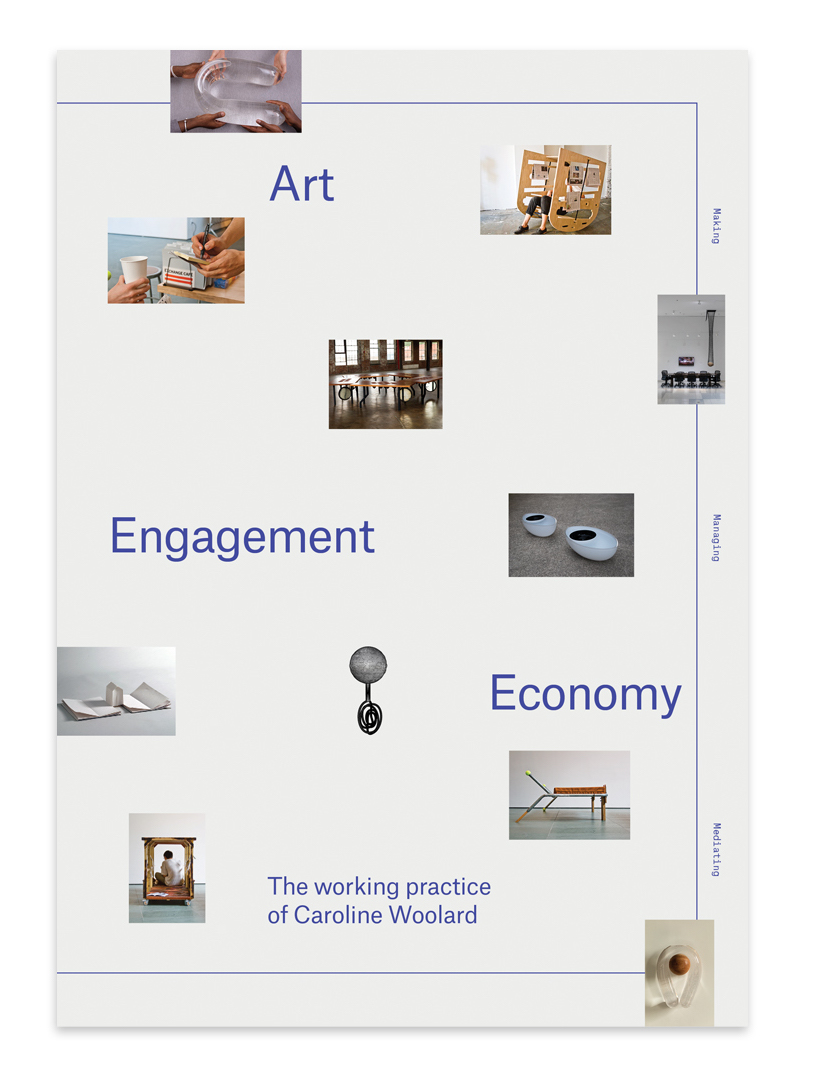Art, Engagement, Economy: the Working Practice of Caroline Woolard (2020)
Filed under book | Tags: · art, collaboration, collaborative art, economics, labour, political economy, politics, socially engaged art

“Art, Engagement, Economy: the Working Practice of Caroline Woolard proposes a politics of transparent production in the arts, whereby heated negotiations and mundane budgets are presented alongside documentation of finished gallery installations.
Readers follow the behind-the-scenes work that is required to produce interdisciplinary art projects, from a commission at MoMA to a self-organized, international barter network with over 20,000 participants. With contextual analysis of the political economy of the arts, from the financial crisis of 2008 to the COVID pandemic of 2020, this book suggests that artists can bring studio-based sculptural techniques to an approach to art-making that emphasizes interdisciplinary collaboration and dialogue.”
Foreword by Patricia C. Phillips; introduction by Caroline Woolard; texts by D. Graham Burnett, Alison Burstein, Stamatina Gregory, Larissa Harris, Leigh Claire La Berge, Stephanie Owens, Cybele Maylone, Steven Matijcio, Sheetal Prajapati, Caitlin Rubin, Gabrielle Lavin Suzenski, and Caroline Woolard; interviews by Thyrza Nichols Goodeve and Tina Rivers Ryan.
Publisher Onomatopee, Eindhoven, November 2020
Creative Commons BY-SA License
ISBN 9789493148345, 9493148343
568 pages
Book website
Publisher
WorldCat
PDF (287 MB, last section missing)
PDFs
Eglė Rindzevičiūtė: The Power of Systems: How Policy Sciences Opened Up the Cold War World (2016)
Filed under book | Tags: · biosphere, cold war, computing, cybernetics, environment, governmentality, history of science, networks, politics, secrecy, soviet union, systems science, systems theory

“In The Power of Systems, Eglė Rindzevičiūtė introduces readers to one of the best-kept secrets of the Cold War: the International Institute of Applied Systems Analysis (IIASA), an international think tank established by the U.S. and Soviet governments to advance scientific collaboration. From 1972 until the late 1980s IIASA in Austria was one of the very few permanent platforms where policy scientists from both sides of the Cold War divide could work together to articulate and solve world problems. This think tank was a rare zone of freedom, communication, and negotiation, where leading Soviet scientists could try out their innovative ideas, benefit from access to Western literature, and develop social networks, thus paving the way for some of the key science and policy breakthroughs of the twentieth century.
Ambitious diplomatic, scientific, and organizational strategies were employed to make this arena for cooperation work for global change. Under the umbrella of the systems approach, East-West scientists co-produced computer simulations of the long-term world future and the anthropogenic impact on the environment, using global modeling to explore the possible effects of climate change and nuclear winter. Their concern with global issues also became a vehicle for transformation inside the Soviet Union. The book shows how computer modeling, cybernetics, and the systems approach challenged Soviet governance by undermining the linear notions of control on which Soviet governance was based and creating new objects and techniques of government.”
Publisher Cornell University Press, Ithaca, NY, 2016
Creative Commons BY-NC-ND 4.0 International License
ISBN 9781501703188, 1501703188
xi+292 pages
Reviews: Roundtable: Barbara Czarniawska, Jenny Andersson, Claudia Aradau, Paul Rubinson, author’s response (H-Diplo, 2019), Kristine C. Harper (Isis, 2018), Benjamin Peters (Slavic Review, 2019), Gerald Easter (American Historical Review, 2018), Jeanne Morefield (J History of Ideas, 2020), Laurent Coumel (Cahiers du monde russe, 2018, FR), Una Bergmane (Lithuanian Historical Studies, 2018), Christian Dayé (Serendipities, 2018).
PDF (19 MB)
Comment (0)Avery F. Gordon: The Hawthorn Archive: Letters from the Utopian Margins (2018)
Filed under book | Tags: · abolitionism, anarchism, archive, black people, capitalism, colonialism, friendship, politics, race, racism, slavery, utopia

“The Hawthorn Archive, named after the richly fabled tree, has long welcomed the participants in the various Euro-American social struggles against slavery, racial capitalism, imperialism, and authoritarian forms of order. The Archive is not a library or a research collection in the conventional sense but rather a disorganized and fugitive space for the development of a political consciousness of being indifferent to the deadly forms of power that characterize our society. Housed by the Archive are autonomous radicals, runaways, abolitionists, commoners, and dreamers who no longer live as obedient or merely resistant subjects.
In this innovative, genre- and format-bending publication, Avery F. Gordon, the “keeper” of the Archive, presents a selection of its documents—original and compelling essays, letters, cultural analyses, images, photographs, conversations, friendship exchanges, and collaborations with various artists. Gordon creatively uses the imaginary of the Archive to explore the utopian elements found in a variety of resistive and defiant activity in the past and in the present, zeroing in on Marxist critical theory and the black radical tradition. Fusing critical theory with creative writing in a historical context, The Hawthorn Archive represents voices from the utopian margins, where fact, fiction, theory, and image converge.
Reminiscent of the later fictions of Italo Calvino or Walter Benjamin’s Arcades Project, The Hawthorn Archive is a groundbreaking work that defies strict disciplinary, methodological, and aesthetic boundaries. And like Ghostly Matters: Haunting and the Sociological Imagination, which established Gordon as one of the most influential interdisciplinary scholars of the humanities and social sciences in recent years, it provides a kaleidoscopic analysis of power and effect. The Hawthorn Archive’s experimental format and inventive synthesis of critical theory and creative writing make way for a powerful reconception of what counts as social change and political action, offering creative inspiration and critical tools to artists, activists, scholars across various disciplines, and general readers alike.”
Publisher Fordham University Press, 2018
ISBN 0823276325, 9780823276325
xii+472 pages
Interview with author: Krystian Woznicki (transversal, 2019).
Review: Eddie Bruce-Jones (Race & Class, 2019).
PDF (46 MB)
Comment (0)
